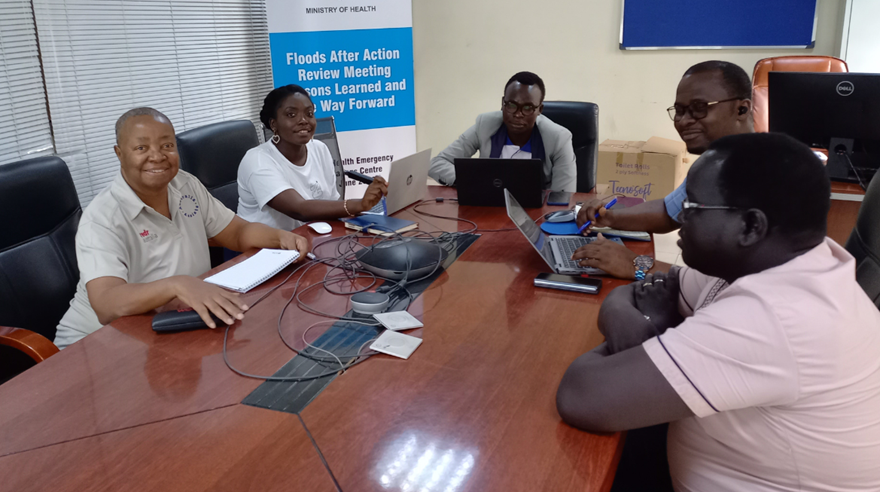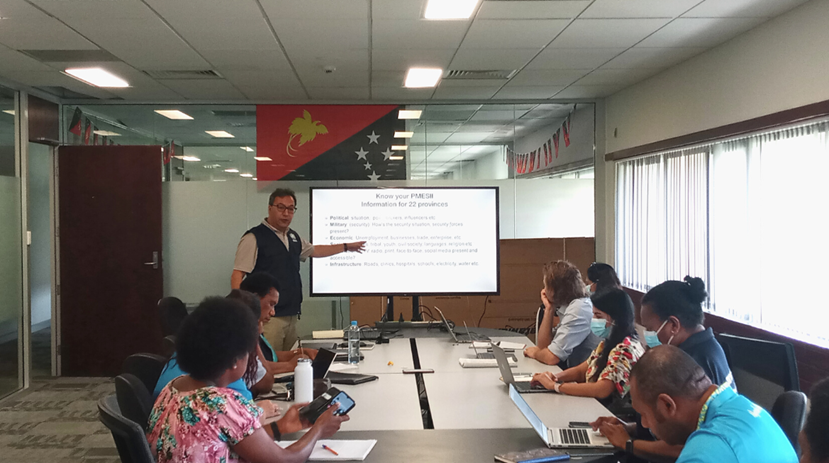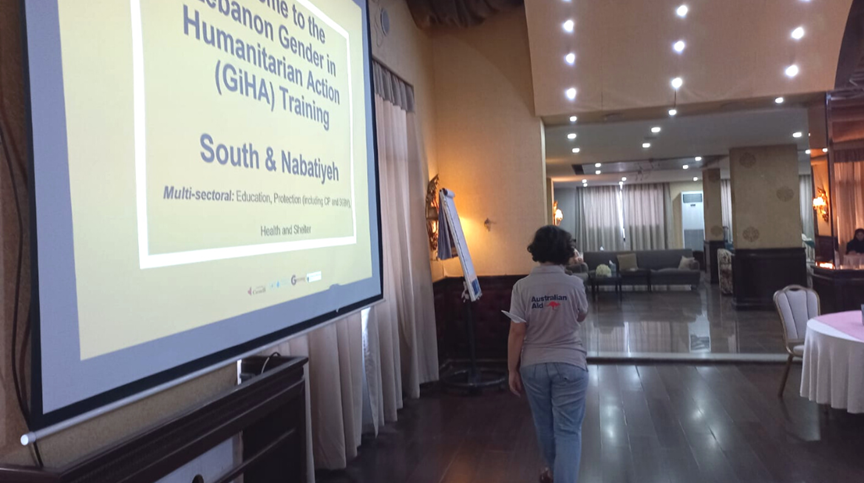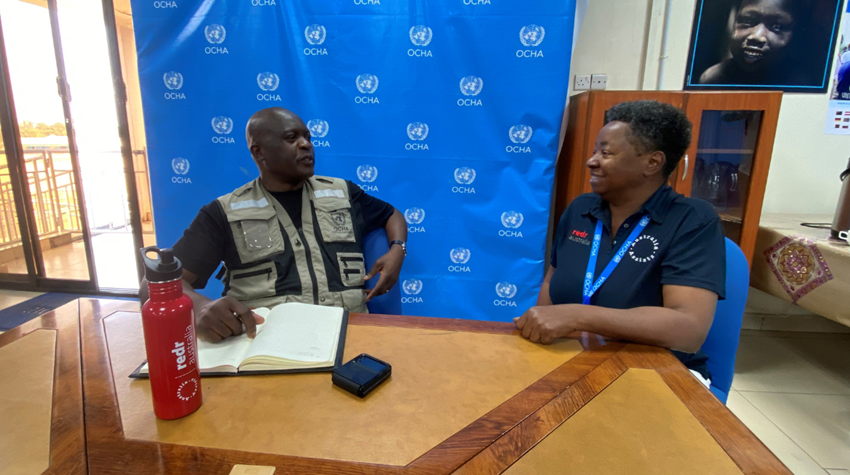Australia Assists deployees are working in the field to inform and support a range of health measures affecting global populations. The Australian Government’s humanitarian civilian deployment program Australia Assists, values health equality and Health for All from South Sudan to Lebanon to Papua New Guinea and beyond.
Health preparedness, critical for future outbreaks
In South Sudan, Australia Assists deployee Olivia is working as an Ebola Virus Disease (EVD) Strategic Coordinator at OCHA. Through her deployment, Olivia is working closely with the South Sudan Ministry of Health to advise, support and provide connections to facilitate planning and decision-making in the event of an EVD outbreak and the ongoing management of other communicable diseases.
Ebola has a high fatality rate and several different variants, some of which have no current known therapeutic treatments. The most recent outbreak of EVD in neighbouring Uganda ended in January 2023, however mitigation tasks remain.
South Sudan continues to contend with EVD, COVID-19 as well as an outbreak of Measles and a recent cholera outbreak in Upper Nile State.
“World Health Day in South Sudan is an important time to think about ways to continue improvements to public health systems, including tools such as vaccinations to prevent some commonly occurring diseases, and simulations to assess operational processes,” said Olivia.
“For me, watching the response to the cholera outbreak declaration which occurred this month has been very beneficial as the process resembles that for a possible EVD response, and it gives me the ability to see how the teams are set up and coordinated in practice. In particular, as this cholera outbreak is limited to Upper Nile state, it is evident that there is a key role for that state’s coordination structures as well as the national ones, and good communications between the two is vital. Such communications is an aspect that we will assess in the forthcoming EVD simulation exercise.”
At the Ministry of Health’s Public Health Emergency Operations Centre, Olivia is an integral part of the planning committee to develop a simulation exercise against an EVD outbreak. The simulation exercise complements a 72-hour response plan developed by the Ministry of Health in the event of a new outbreak.
Prior to working in the humanitarian sector, Olivia studied electronic engineering and worked in the Australian telecommunications industry.
“I became a humanitarian through being concerned about the circumstances of refugees, especially those from Sierra Leone my homeland and so I studied international law, planning to become a refugee protection officer,” said Olivia.
“The remit expanded over time, and I became a health worker, working with UNICEF in the Ebola response for Sierra Leone in 2015 as a Child Protection Coordinator.”

Australia Assists deployee Olivia (left) meeting with Ministry of Health representatives
Improving health promotion through communications
Communications specialist Wahid Feroz recently completed a deployment in Port Moresby, Papua New Guinea through the World Health Organisation. Thanks to support from Australia Assists, Wahid was able to provide assistance on the ground with communications support for the ongoing COVID-19 pandemic.
Wahid worked with members of the National Department of Health and National Control Centre to help amplify the delivery of crisis communication and COVID-19 messaging.
As part of his deployment, Wahid travelled to Manus province to support Health Care Workers with effective messaging to promote behavioural change and COVID-19 vaccination. His technical experience helped with media engagement to support the local population access timely and accurate information around COVID-19.
Through Australia Assists, Wahid was able to work with WHO to strengthen knowledge on public health measures, vaccination demand and misinformation.

Communications Specialist Wahid giving his first presentation to his WHO colleagues and partner staff regarding his proposed strategy and approach to crisis communications.
Australia Assists amid health outbreaks
In Lebanon, Australia Assists deployee May was already on a 12 month deployment as a Gender and humanitarian officer for UN Women when a cholera outbreak occurred in early October of 2022.
This was the first documented outbreak of cholera in Lebanon since 1993.
A significant part of May’s role is responding to training requests for humanitarians on gender and protections issues. In the first four months of her deployment, May facilitated 24 training sessions to more than 500 humanitarian personnel in Lebanon. Amid the cholera outbreak, May became the cholera focal point for UN Women.
“One thing I was able to contribute to, as part of the Gender Working Group (coordination), was pushing for gender data in the cholera outbreak. We know that cholera has a gendered dimension,” said May.
“Studies have found that adult women and school-aged girls had consistently higher rates of cholera than their male counterparts. In fact, in the first few months we found that 53 per cent of the cases were women.”

Australia Assists deployee May provides training to humanitarian actors
Research has shown a higher risk of morbidity from cholera for women, especially pregnant and lactating women compared to men. The domestic roles held by women such as house chores, child care and caring for sick family members also places them at a higher risk of contracting cholera.
May was able to share her research and knowledge of the impact of gender on a health outbreak like cholera with key health actors. The Lebanese Ministry of Public Health is now providing gender data breakdowns on the cholera affected population.
Health equity is one way Australia Assists helps alleviate the life altering impacts of preventable or treatable disease. The Health for All theme is well understood by Australia Assists deployees, who recognise addressing healthcare equity as an integral part of mitigating local health crises from developing into global emergencies. The continued work of deployees like, Olivia, Wahid and May can make a measurable difference to communities and ensure preparedness against emergent and novel outbreaks.
Learn more about Australia Assists and the work of deployees before, during and after emergencies.
1 https://www.who.int/campaigns/75-years-of-improving-public-health/key-messages


